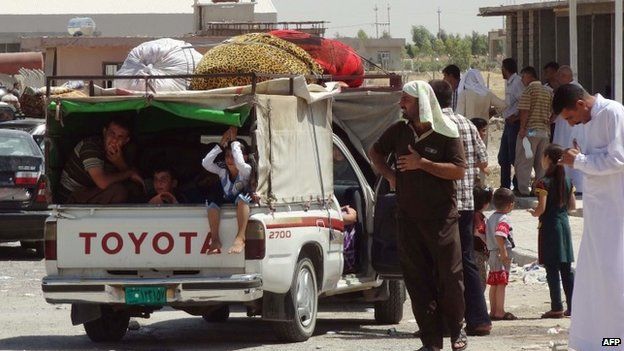Iraq conflict: Kurds 'recapture oilfields from IS'
- Published

Kurdish Peshmerga forces say they have retaken oilfields near Mosul in north Iraq from Islamic State (IS) militants.
The attack on the three Ain Zalah installations began on Thursday morning, they said, but the militants blew them all up as they retreated.
The area is part of a large swathe of territory in northern Iraq overrun by Islamic State in recent weeks.
Iraqi and Kurdish forces backed by US air strikes have regained some ground, including the vital Mosul dam.
IS-led violence has driven an estimated 1.2 million Iraqis from their homes.
Whole communities of minority Yazidis and Christians have been forced to flee in the north, along with Shia Iraqis, whom IS do not regard as true Muslims.
At the scene. Gabriel Gatehouse, BBC News, from the Iraqi-Syrian border
A Kurdish father who was forced to abandon his disabled son while fleeing IS fighters, spoke to the BBC after learning of his child's death
In the scorching midday heat, Kurdish fighters loose off a few rounds of anti-aircraft fire towards the positions of Islamic State just a few hundred metres away.
"We want to make sure they know we're here," says Agid Gabar, a 21-year-old fighter.
Some are Kurds from Turkey, members of the PKK, which the US and the EU have labelled a terrorist organisation. Most are Syrian Kurds, who have been battling Islamic State for more than two years now.
We meet in the no-man's land that was once the border between Syria and Iraq. Now, IS has erased the frontier.
People on both sides are forced to make almost impossible decisions. In a nearby camp for Yazidi refugees, we meet Jalal Badr Piso. This month he and his wife were forced to abandon their disabled four-year-old son, Aziz, on Sinjar mountain as they fled the IS advance in Iraq.
For nearly two weeks, Aziz became "the boy with no name", after Kurdish fighters rescued him from the mountainside and took him to a hospital in Kurdish-controlled Syria to be treated for extreme dehydration and sunburn to the eyes.
When Aziz's photo appeared on Facebook and the BBC, relatives alerted the father. Jalal made the journey to Syria on Thursday, hoping to be reunited with his son. But he arrived too late. Aziz died early that morning.
Peshmerga sources said they had advanced in the Zumar area at 04:00 local time on Thursday (01:00 GMT), capturing several villages.
But as they advanced towards the oil installations the militants put explosives inside them and blew them up.
Eyewitnesses saw huge columns of black smoke rising from the oilfields on Thursday morning.
Correspondents say IS still controls a large area to the west of Mosul lake.
The advances came as IS released a video appearing to show a beheading of a Kurdish man, meant as a warning to Peshmerga forces.
The victim is seen kneeling near a mosque in the city of Mosul before he is beheaded. The jihadists warn that others will be killed if Kurdish leaders continue to back the US.
Last week, IS drew worldwide condemnation after releasing a video showing the beheading of US journalist James Foley.
IS also controls large parts of Syria, where recently it has seized several government bases in north-eastern Raqqa province.